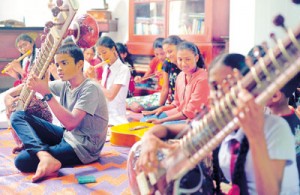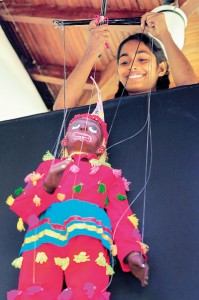Walking into a ‘tuneful’ house

A home turns into a music class: The children playing various instruments
Soft footfalls as twos and threes walk in, some still in school uniform, and signal the start of classes. Then begin the sound of notes emanating from varied musical instruments, as tuning is performed by the children themselves.
Between the 217th and 218th kilometre-post and Hungama and Nonagama in the deep-south, off the Tangalle-Hambantota Road, is a walauwwe-like house, now the home of a well-known retiree.
Every single week day, in the afternoons, and Saturdays and Sundays, practically the whole day, the dining table is pushed back, huge mats are spread on the floor and the home becomes a class where the impoverished children of the villages surrounding this retiree’s home are nurtured in music, English, general knowledge and computer.
The latest addition is rookada (puppetry), with the retiree himself driving down to Ambalangoda and purchasing three puppets and also paying for a small stage to be constructed in the rear verandah overlooking a still pond with water lilies.
Welcome to the Kiula Kiyawana Gunaya Free Classical & Folk Music Class which we see in action on the lazy and overcast Wednesday afternoon of March 1, with showers of rain on and off.
The beginnings were back in 2002, when the retiree and one of his daughters who lives in America were travelling in the south and saw this house with all its old world charm, in a somewhat dilapidated condition, fell in love with it and bought it. With his busy work life which entailed much travel abroad, he was only able to renovate the house in 2006, with the intention of launching a small tourism project through which he was bent on helping the village. Maintenance of this house in Kiula for such a project, however, was too costly and after retirement he decided to make it his home.
Yes, he tells us, reading our minds, the village takes its name from the fact that the water in the area is ‘kiul’ (hard) as it gets mixed with an underground seashell bed and salt water.

Lots to smile about: A young girl tries out her puppetry skills. Pix by Amila Gamage
“I left Colombo for good. Stopped earning and began living off my savings, while my two daughters decided to help this special project we started in Kiula,” he says, explaining that the biggest problem for the people, especially the women in the area, was jobs. They had to go in search of work at garment factories, while the men were labourers in fishing or agriculture or in the sippi (sea-shell) industry, where they crushed it and added it to make chicken feed.
He mulled over the plight of these village children and picked on the idea of expanding their knowledge and also their dreams and launched a mobile library. Not only did he buy second-hand books but he also begged of his friends to donate whatever books they could, getting a “fairly good collection”.
His golaya, Nalaka, would then hire a trishaw and with songs indicating its arrival, the mobile library would do its rounds in the villages which have about 300 families. There followed essay and reading competitions with famous figures gracing these occasions of the Kiula Kiyawana Gunaya. The children who were part of the mobile library would also hold an annual concert and entertain the people at a Blind Elders’ Home close-by during almsgivings.
Gradually, seeing their musical talents, the retiree launched workshops with the support of two music teachers on Sunday mornings, after the children had mandatorily been to dhamma lessons at the Buddhist temple.
The rest is history and it is their musical journey that we witness on that Wednesday – tabla, sitar and violin players, flautists and even a guitar, notes both musical and vocal rising to a crescendo as the afternoon progresses – swara, raga, the theme song of the ‘Titanic’ along with a solo voice taking the high notes, the haunting strains of Pandit Amaradeva’s ‘Sasala Vasana Thuru’, ‘Chinna China Asaia’ in Tamil and even the Indian national anthem.
Forty children now walk into this house, to learn different skills on different days. Mondays are set apart for flute; Tuesdays for vocals; Wednesdays for tabla and sitar; Thursdays for tabla for another age-group and computer for the others; Fridays for tabla, violin and computer; Saturday being “mixed” with knowledge not being imparted in school being disseminated along with important events of that week; and Sunday for vocal and instrumental group-work for the whole lot.
It is like a regular school, but everything is free, with a small snack thrown in daily, sometimes a vadai and a yoghurt or a piece of cake and a Milo for each child.
And it is not just for fun that they sing and learn to play an instrument, they have been slowly and surely securing certificates (mostly 1st Divisions) at examinations conducted by visiting professors of the Bhathkanda Sangeeth Vidyapeet of Lucknow, India, going by a hired bus to Badulla to face those and also making it an enjoyable outing.
“I discourage prasanga (shows),” says the retiree, adding that music should be learnt not to show off but to acquire a good skill. However, once a year, the parents are invited to view the achievements of their children.
The children’s horizons have widened, opening out vast vistas of possibility, as Malki Lakshani tells us without reticence that she is hoping to become an engineer, Saddami Samudi a whiz-kid with guitar, sitar and vocals, that she wants to go to the moon after becoming an astronomer and Madhava that he has set his sights on becoming a doctor of forensics.
As the evening shadows lengthen over Kiula, there is reluctance not only on the part of the children but also the two teachers, Gayani and Jayanthi, to call it a day.
For, they have just ventured into another art – rookada (puppetry) for which the south is famous. They show off their talents, even though it is the first day they are trying out their hands with a puppet king, a queen and a joker to lilting recorded music.
The finale is several children themselves mimicking the puppetry moves and dancing along with the rookada being manipulated by others, while they and the audience go into fits of laughter.
| You can do your bit by heading for Country Roads tonight You could contribute to the efforts of the ‘Kiula Kiyawana Gunaya and Free Classical & Folk Music Class’ by buying a ticket for ‘Country Roads’, the 29th anniversary children’s charity concert organized by the Country Music Foundation (CMF) today at Mount Lavinia Hotel at 6.30 p.m. All funds raised from the concert will support many efforts to uplift the plight of children across the country — ‘Kiula Kiyawana Gunaya and Free Classical & Folk Music Class’ to buy more musical instruments and also provide a few educational scholarships to children there; donation of a few computers to Horizon Lanka Foundation in Maha Willachchiya; and several more children’s organizations in Batticaloa, Hatton and also Jaffna. |


